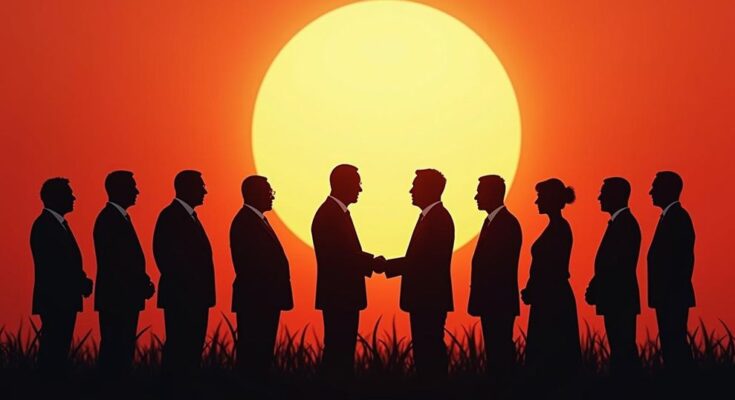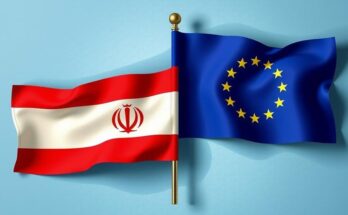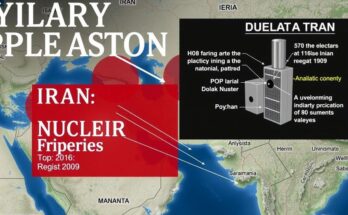Leaders of ASEAN met in Vientiane, Laos, to discuss the civil war in Myanmar and South China Sea tensions. Key discussions were anticipated regarding U.S.-China relations, and the summit included new leadership within member states. Myanmar’s ongoing crisis and geopolitical challenges posed significant questions about ASEAN’s effectiveness and unity moving forward.
Southeast Asian leaders convened in Vientiane, Laos, on Wednesday for an annual summit aimed at addressing pressing regional issues, prominently including the ongoing civil war in Myanmar and escalating territorial disputes in the South China Sea. These issues continue to challenge the credibility of the Association of Southeast Asian Nations (ASEAN). The summit serves as a precursor to dialogues with major global powers, including China, the United States, and Russia, all vying for influence in the region. The leaders are expected to also address rising violence in the Middle East, despite Southeast Asia experiencing only indirect ramifications from those events. Historically, ASEAN has faced limitations in its influence even among its member states, yet it continues to provide a platform for dialogue among superpowers interested in the region’s stability and development. The ten ASEAN members—Indonesia, Thailand, Singapore, the Philippines, Vietnam, Malaysia, Myanmar, Cambodia, Brunei, and Laos—will engage in discussions with external partners from Japan, South Korea, India, and Australia on various issues, including economic collaboration, climate change, and energy-related matters. In his opening remarks, Lao Prime Minister Sonexay Siphandone expressed that Laos aims to facilitate cooperation among member states during its chairmanship. He stated, “We help one another, and work together the ASEAN way. We will discuss and strengthen cooperation between ASEAN members and other dialogue partners, along with upholding the unity and centrality of ASEAN.” The summit marks a significant transition in leadership roles, with Thailand’s new Prime Minister Paetongtarn Shinawatra, who is the youngest leader at 38, and Singapore’s new Prime Minister Lawrence Wong, who succeeded long-serving leader Lee Hsien Loong. Vietnam’s representation comes through Prime Minister Pham Minh Chinh, while Indonesia’s President Joko Widodo is absent due to a leadership transition, sending Vice President Ma’ruf Amin in his place. U.S. Secretary of State Antony Blinken will represent the Biden administration, while China’s Premier Li Qiang is set to attend. Tensions between the U.S. and China, particularly regarding Beijing’s assertiveness in the contested South China Sea, are anticipated to be significant topics of discussion. Dan Kritenbrink, the top U.S. diplomat for Asia, indicated that issues involving China, including territorial disputes, would likely dominate the agenda. The South China Sea remains a contentious area with overlapping claims involving ASEAN members, such as Vietnam, the Philippines, and Malaysia. “It is the preference for conflict avoidance while getting geostrategic benefits where possible,” identified Muhammad Faizal Abdul Rahman, a research fellow in Singapore, emphasizing that national interests may overshadow collective regional interests. The ongoing crisis in Myanmar, which has led to approximately 6,000 deaths and 3 million displaced since the military coup in February 2021, has put ASEAN’s credibility to the test. Although Myanmar’s junta has committed to an ASEAN peace plan, the lack of implementation continues as fighting persists against pro-democracy groups. Thailand is set to host a regional meeting concerning Myanmar in December, although the participation of Myanmar representatives remains uncertain. Furthermore, Myanmar’s Foreign Ministry permanent secretary attended the summit, marking the country’s first high-level representation since being barred by ASEAN from sending political officials in late 2021. Experts note that this may signify ASEAN’s struggle to effectively manage the prolonged political crisis, suggesting that chances for breakthrough solutions are minimal.
The article discusses the 2023 ASEAN summit held in Vientiane, Laos, focusing on critical issues affecting the region, particularly the civil unrest in Myanmar and territorial claims in the South China Sea. It highlights the role of ASEAN as a platform for dialogue among member states and global powers, as well as outlining the challenges faced by the organization in reaching consensus and taking assertive actions. The context of new leadership within several ASEAN countries and the implications of U.S.-China relations in the region are also considered important aspects of this meeting.
In conclusion, the ASEAN summit in Vientiane underscores significant regional challenges, including the continuing violence in Myanmar and territorial disputes in the South China Sea. As global superpowers seek to influence Southeast Asia, ASEAN aims to navigate its roles amid new leadership dynamics while addressing the pressing need for stronger collaboration among its members. The outlook for resolving these challenges remains unclear, with national interests often taking precedence over regional solidarity.
Original Source: www.arabnews.com




